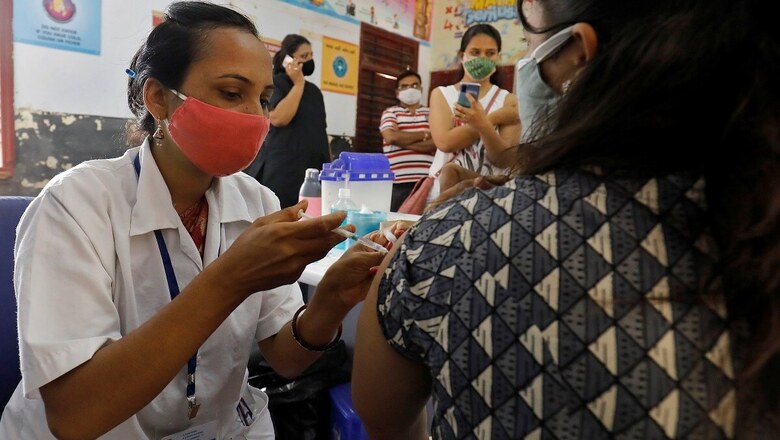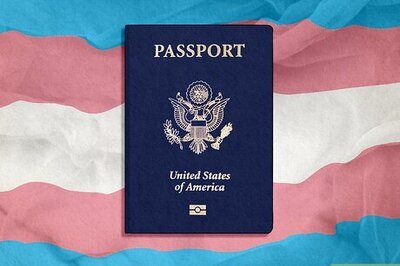
views
India has become the second country after the US to have crossed 20 crore cumulative COVID-19 vaccination coverage, the Union health ministry said on Wednesday. India achieved this coverage in 130 days as against the USA’s feat in 124 days, the ministry said. According to data available on Our World In Data and multiple sources, other leading countries in COVID-19 vaccination drive include the UK which has reached 5.1 crore mark in 168 days, Brazil that reached 5.9 crore mark in 128 days, and Germany which reached 4.5 crore mark in 149 days. On the 130th day of the drive, the cumulative COVID vaccination coverage crossed the 20 crore mark (with 20,06,62,456 doses including 15,71,49,593 first dose and 4,35,12,863 second dose of COVID-19 vaccines), according to data available at 7 AM,” the ministry said. Over 34 per cent of the population above 45 years has received at least the first dose of COVID-19 vaccine in India till date. Similarly, over 42 per cent of 60+ years of population in India has received at least first dose of COVID-19 vaccine, the ministry said.
India’s COVID-19 vaccination drive was launched by Prime Minister Narendra Modi on January 16. As on date, India is using three vaccines against COVID-19 in its immunisation drive, these include the made-in-India vaccines Serum Institute of India’s Covishield and Bharat Biotech’s Covaxin. Russian Sputnik V is the third vaccine to get approval from the Drug Controller General of India (DCGI) for Emergency Use Authorisation and is being used in a few private hospitals which are expected to be increased over the coming days, the ministry said.
In Phase I of the vaccination drive, started 130 days ago on January 16, the National Expert Group on Vaccine Administration for COVID-19 (NEGVAC) prioritised healthcare workers, and frontline workers (both government and private sector). Phase II of the vaccination drive started from March 1, focused on protecting the most vulnerable age groups. These prioritised age-groups included people above 60 years of age and those above 45 years with associated specified co-morbidities. This was further relaxed to all people above 45 years of age on April 1. In the third phase, ‘Liberalised Pricing and Accelerated National COVID-19 Vaccination Strategy’ was adopted on 1st May 2021. Under this strategy, everyone above 18 years of age are eligible for COVID-19 vaccination.
Meanwhile, the Union health ministry, in its latest clinical management protocol for Covid-19, has said the majority of the transmission is believed to occur “predominantly through the airborne route and droplet released when the infected person coughs, sneezes or talks”. This marks a change from last year’s clinical management protocol, published in June 2022, in which the ministry said that the infection spreads through close contact, “mainly through respiratory droplets that are released when the infected person coughs, sneezes and talks.”
In Gujarat, the state government on Wednesday decided to relax the night curfew timings by an hour in 36 cities, while the day time restrictions will remain in place as the state witnesses a significant drop in the new coronavirus cases. Chief Minister Vijay Rupani made the announcement regarding the revised curfew timings after a cabinet meeting in Gandhinagar. From Friday, the night restrictions on people’s movement will be effective from 9 pm to 6 am in 36 cities, the chief minister said. Currently, the night curfew is being enforced from 8 pm to 6 am.
Further, amid rising cases of mucormycosis, all district hospitals in Karnataka have been instructed to have a dedicated post-Covid ward to check for black fungus infection in patients who have recovered from the virus. “After one week of discharge, Covid recovered persons should get themselves tested at post Covid ward or can get a teleconsultation. Recovered person will be contacted to check for symptoms of fungus infection. If symptoms found they will be called to hospitals,” Karnataka Health Minister Dr K Sudhakar said.
“During discharge, Covid patients will be tested for any fungus infection and will also be subjected to MRI scan if necessary. All district hospitals have been instructed to have a dedicated post-covid ward,” he added. Warning against indiscriminate use of steroids, he said, “Using steroids in first week of COVID treatment is one of the causes of black fungus infection. This needs to be avoided and it should be used only from 2nd week. A new discharge policy and post-COVID precautions have been formulated for recovered patients.”
Read all the Latest News, Breaking News and Coronavirus News here. Follow us on Facebook, Twitter and Telegram.


















Comments
0 comment